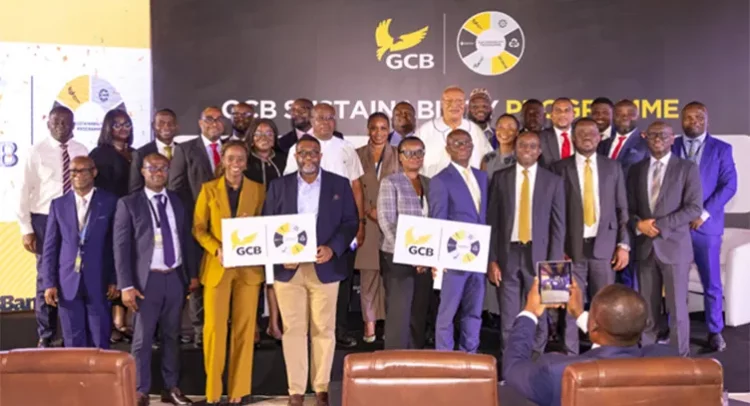Officials of GCB Bank and participants in a group photograph
GCB Bank Plc has unveiled a comprehensive sustainability programme that sets a new standard for responsible banking in the country.
At the heart of the programme are six flagship initiatives, namely Sheagles Soar, R³ (Reduce, Reuse & Recycle), i-360, Evolve, and EagleTouch, designed to embed social impact, environmental stewardship, and strong governance across the bank’s operations. Together, they position GCB as a leader in sustainable finance.
Launching the programme, the Board Chairman, Professor Joshua Alabi, described it as a “blueprint for a sustainable future,” noting that GCB is determined to lead sustainable banking in Ghana and beyond.
“As the premier bank, we must lead by example. By putting people and planet first in all our operations, we will secure profit in the truest sense, profit that is inclusive, resilient, and beneficial to all stakeholders,” Prof. Alabi said.
The Managing Director, Farihan Alhassan, emphasised that sustainability is not an add-on but a cultural shift within GCB.
“Our strategy is anchored in a baseline assessment aligned with national and global commitments, including the Paris Agreement and the UN SDGs. Built on three pillars, Environmental Stewardship, Social Responsibility, and Ethical Governance, it reflects the triple bottom line of people, planet, and profit.”
Head of Special Projects and Investor Relations, George Fuachie, added that GCB is determined to lead the charge. “Sustainability is no longer a buzzword; it has become a way of doing business.”
The launch featured a panel discussion titled “People, Planet, and Profit: Sustainable Operations for Impact and Opportunity,” moderated by Cynthia Ofori-Dwumfuo, Chief Marketing, Communications and Customer Experience Officer of GCB Bank.
The panel included GCB Board Member Pamela Addo, SUCCA Africa’s Mark Ofori Kwafo, and GCB’s Head of Credit Risk, Edward Sasu Adofo.
Panelists called for sustainability to be fully integrated into banking operations, highlighting financial inclusion, gender-responsive products, youth banking, and climate-smart agriculture as key to long-term impact.
They cautioned that climate risks pose real threats but also open opportunities in renewable energy, green jobs, and sustainable farming.
Profitability, they stressed, must advance hand in hand with social empowerment and environmental care.
A Business Desk Report


